Turkey, which had previously given priority to the West, suddenly turned to the Middle East. By supporting the Muslim Brotherhood-affiliated political currents in Egypt, Syria, Tunisia, Libya and even Palestine, it sought to establish itself in the Middle East and, on the other hand, considered its political-economic model a suitable model for The Arab countries of the Middle East that either their political systems had been changed or their political systems were prone to change or were changing.
This policy of Turkey caused tensions in its relations with other countries in the region. Support for the Muslim Brotherhood placed Turkey against countries such as the United Arab Emirates, Saudi Arabia and the Egyptian army, which have historically been considered as hostile to the Muslim Brotherhood. Also, supporting the Palestinian Brotherhood and giving them an office in Ankara and taking critical positions against the Zionist regime, intensified tension in relations between Turkey and the Zionist regime. In addition, Turkey’s efforts for the Muslim Brotherhood to seize power in Syria had caused great concern for the Zionist regime.
At first, Erdogan’s government was very happy with the victory of the Brotherhood in countries such as Egypt, and along with the Qatari government, continued to fully support the Brotherhood in the region. But the fall of Egyptian President Mohamed Morsi, a leading member of Egypt’s Muslim Brotherhood, which was met with an immediate response from the UAE and Saudi Arabia, provoked strong opposition from Turkey. Turkey called the new Egyptian government led by al-Sisi a coup government and refused to recognize it.
Following the weakening of the position of the Muslim Brotherhood in Egypt, especially after the 2013 military coup, the Palestinian Brotherhood was also weakened. In Syria, meanwhile, Turkish-backed currents were gradually weakened with the Syrian government re-establishing sovereignty over the country. Therefore, Turkey, which was previously in an offensive position, was in a defensive position after the mentioned developments, which culminated in a failed coup against Erdogan and the siege of Qatar by some Arab states bordering the Persian Gulf with the support of Egypt. With the victory of Joe Biden in the US elections, which was strongly critical of Erdogan’s approach, Turkey became more and more defensive and even weak.
This situation forced Turkey to change its policies. In fact, on the one hand, the Turkish government did not have good relations internationally with Europe and the United States, and at the regional level, it did not have good relations with governments such as Egypt, the UAE, Saudi Arabia and the Zionist regime, and on the other hand it was under economic pressure. Therefore, Turkey changed its policy with a pragmatic approach. That is to say, at the international level, it cautiously sided with NATO against Russia’s invasion of Ukraine, and at the regional level, it began a policy of normalizing relations with regional governments.
Turkey’s new policy, especially at the regional level, has several serious consequences:
First, the Muslim Brotherhood in the region has lost and is losing one of its main regional supporters. While the leaders of the Brotherhood movement in Egypt are sentenced to severe punishments such as execution and life imprisonment, the Palestinian Brotherhood movements face the acceptance of the Zionist regime by some Arab regimes, and the Brotherhood movement in Syria is in a position of weakness. The new Turkish policy will be a bitter incident for the Muslim Brotherhood. In fact, lack of regional support can plunge the Brotherhood into a political coma for years.
Second, it is possible that the political-military situation in the Arab countries involved in the internal crisis will move towards relative stability. Turkey’s lack or reduction of support for the Brotherhood in the region discourages them from continuing their struggle against the relevant political systems.
Third, it is possible that in the light of normalization of Zionist regime-Turkey and Turkey-Egypt relations, Ankara will try to normalize Arab-Zionist regime and possibly Palestinian-Zionist regime relations in order to gain a foothold in the region and even in the United States.
Fourth, in the light of the normalizations that have taken place, Turkey may enter into cooperative arrangements with those that have entered the process of normalization of relations. For example, Murat Mercan, the Turkish ambassador to the United States, said about the recent normalizations in Turkish relations that the Zionist regime and Turkey can jointly cooperate against “terrorism and malicious countries”.
Fifth, Turkey, by turning away from supporting the Brotherhood in the region in order to facilitate normalization of relations with some countries in the region, Qatar, as another supporter of the movement in the region, may adjust its position towards them.
In conclusion, it should be said that one of the most important reasons for the US Democrats’ opposition to Turkey is Ankara’s regional policies, especially in support of the Brotherhood, which, in the light of normalization developments with some governments in the region, can also put Washington-Ankara relationship on the path of improvement. Thus, Turkey’s recent move, which is in a way acknowledgment of the failure of past policies or a retreat from it, brings Turkey closer to the United States internationally and, at the regional level, strengthens the current that seeks to normalize relations with the Zionist regime. In other words, it can be concluded that the new approach of the Turkish government in the region is a step towards securing the interests of the Zionist regime and ignoring the Palestinian cause.










0 Comments